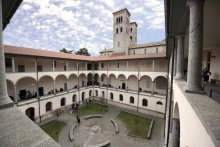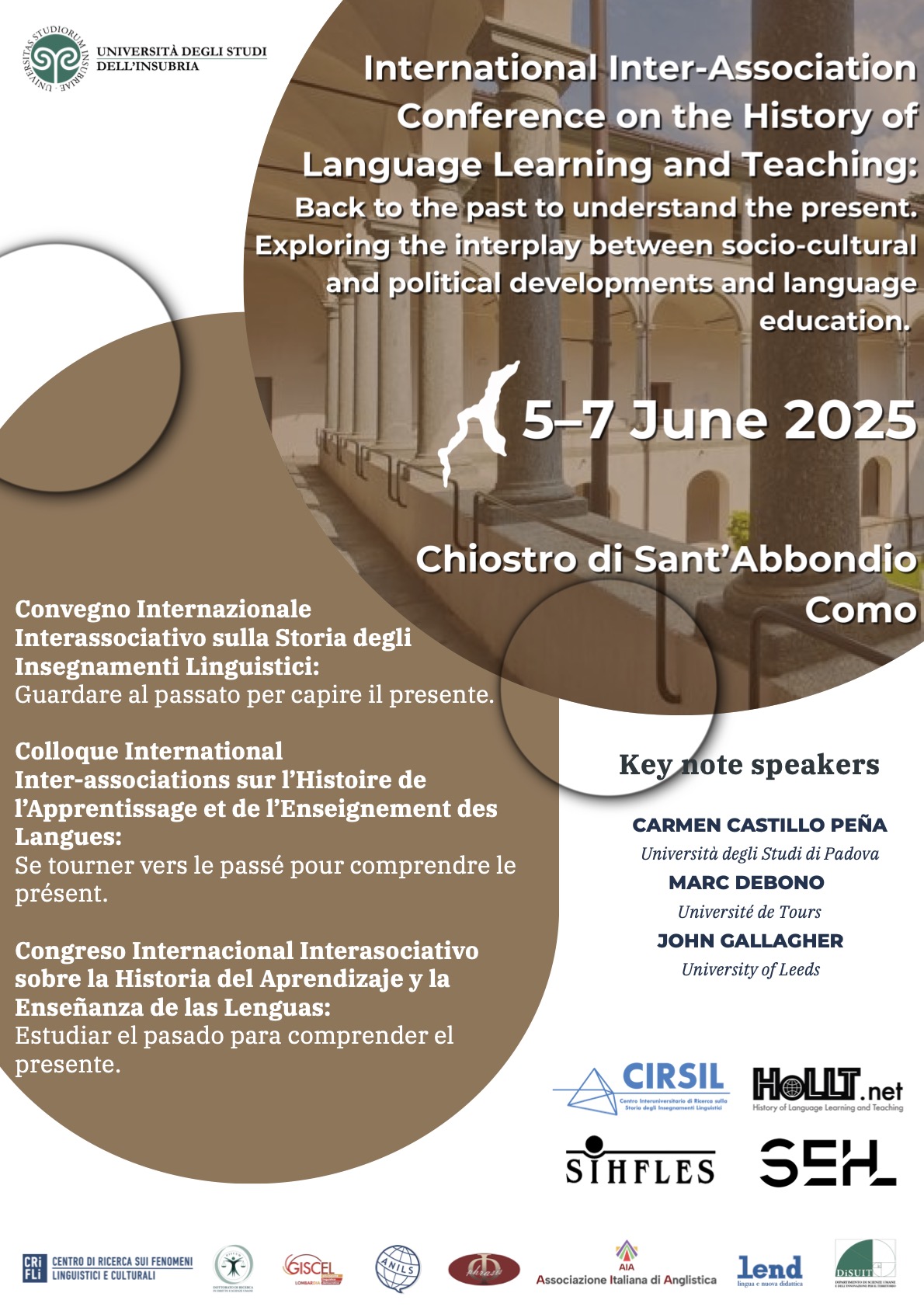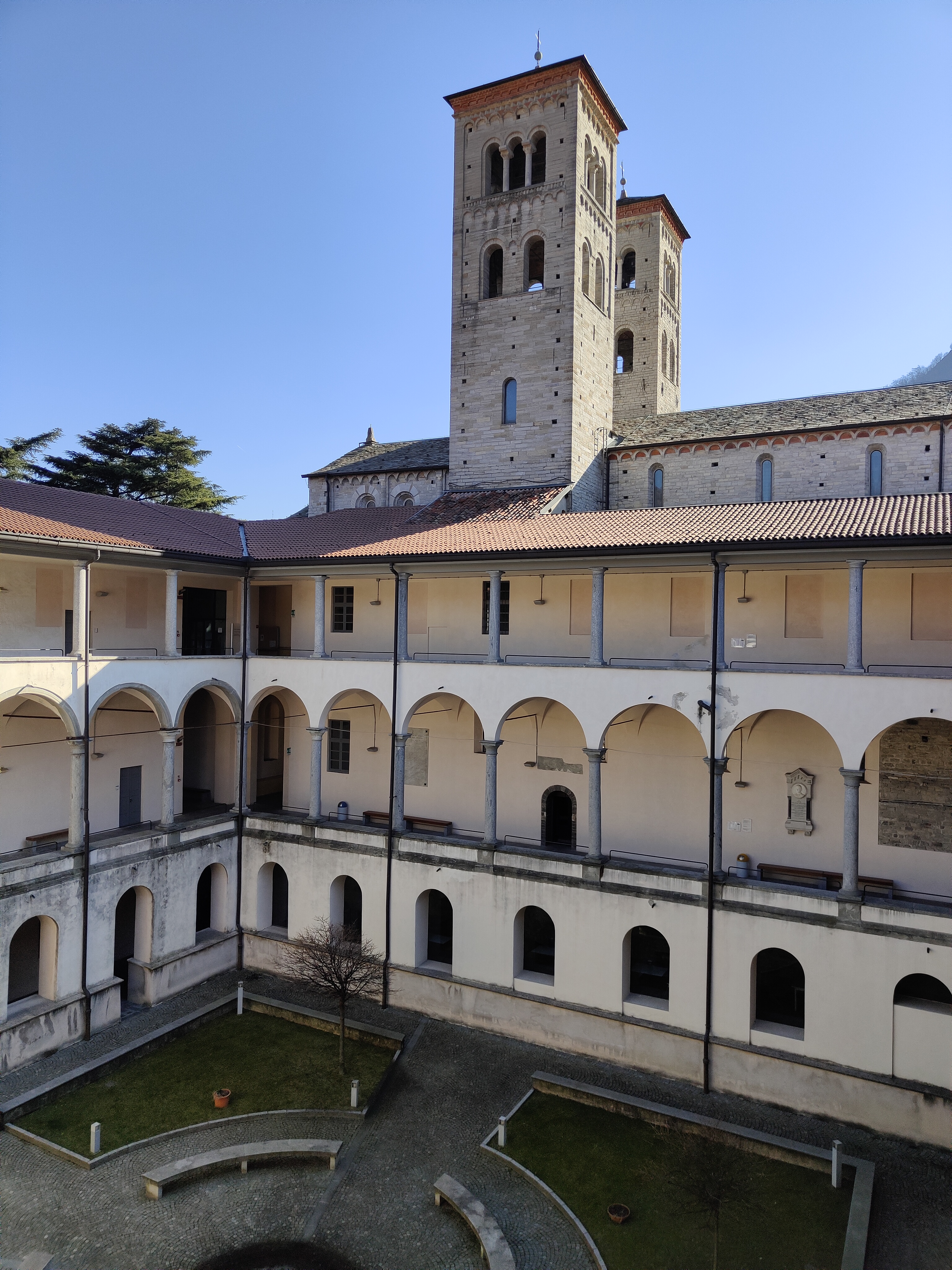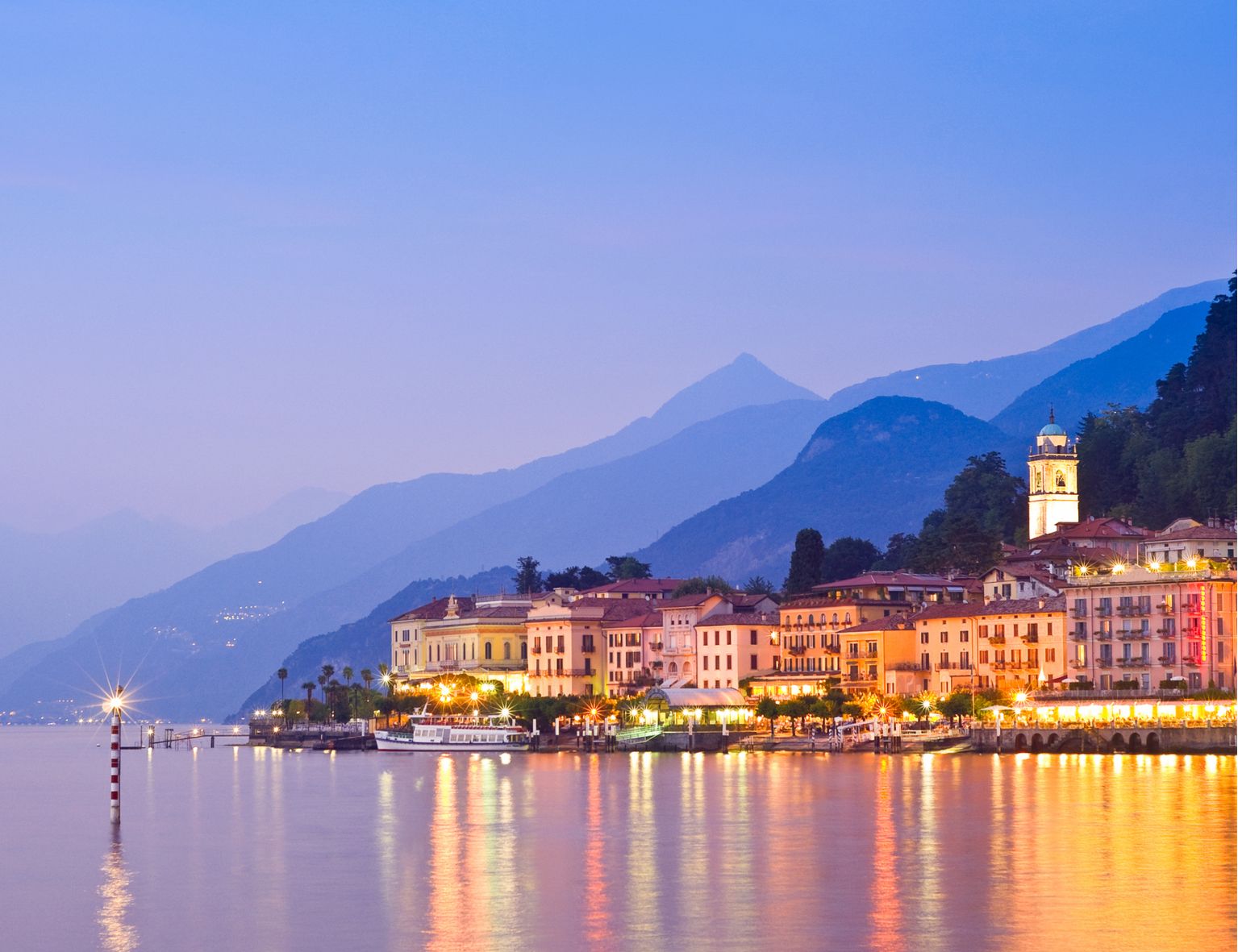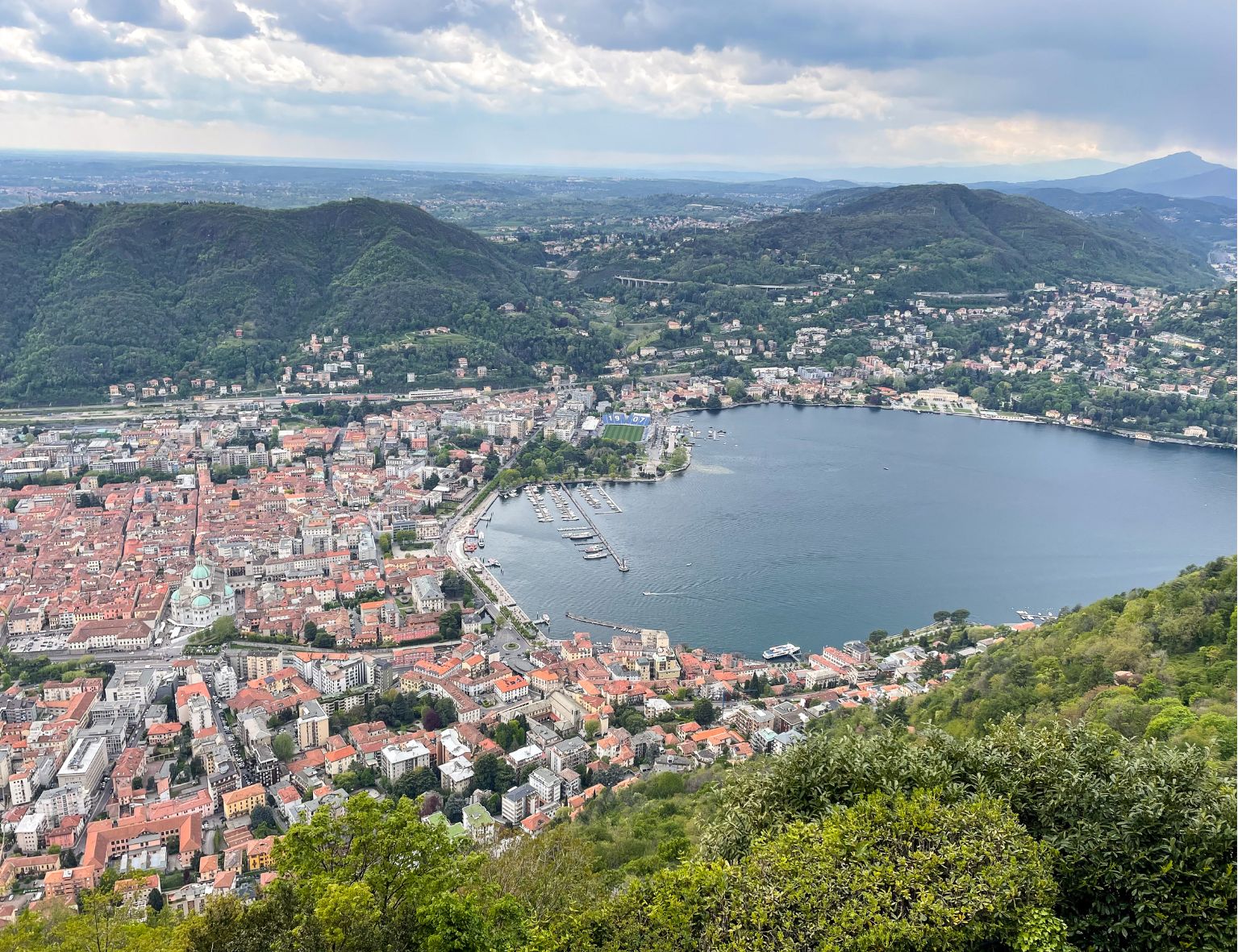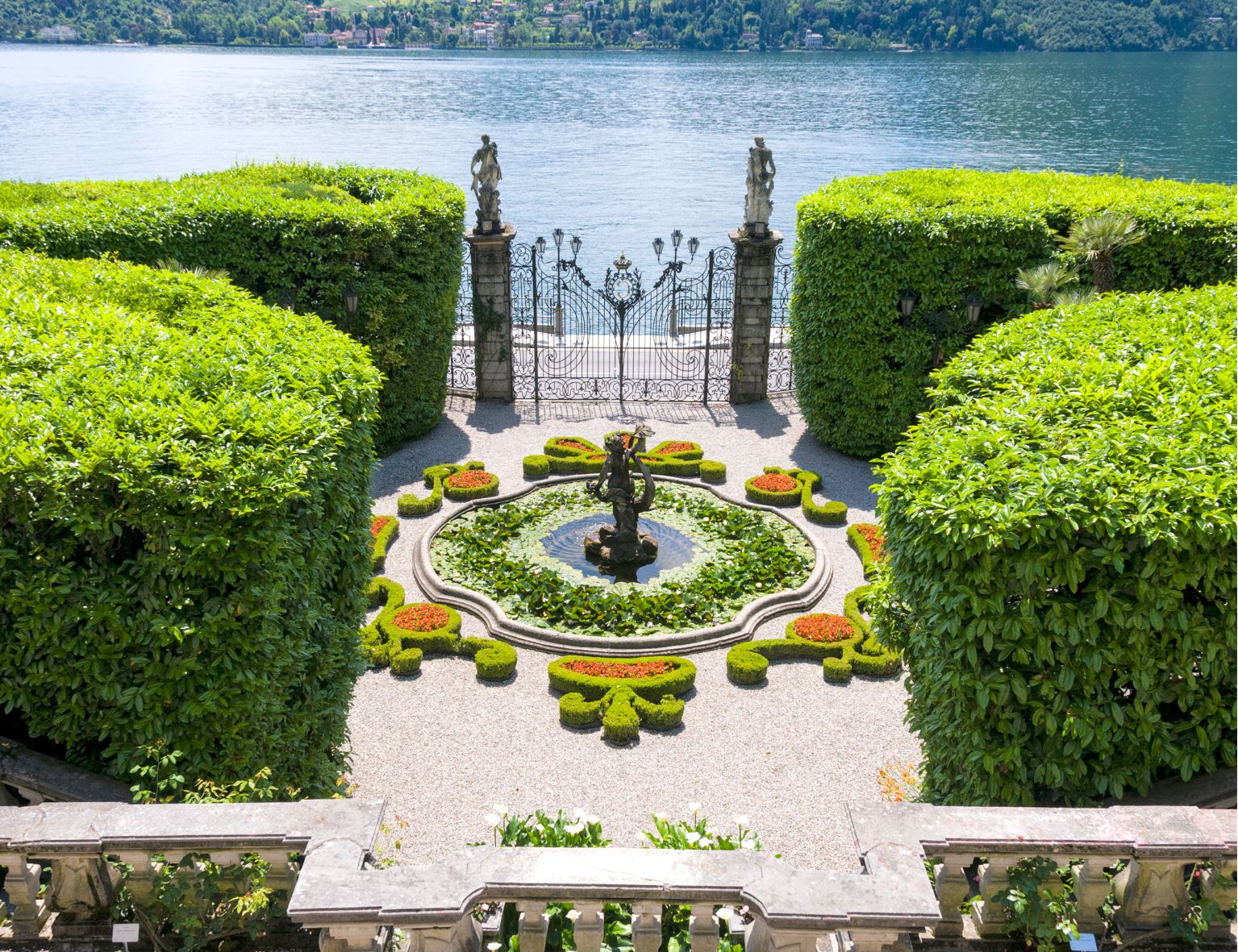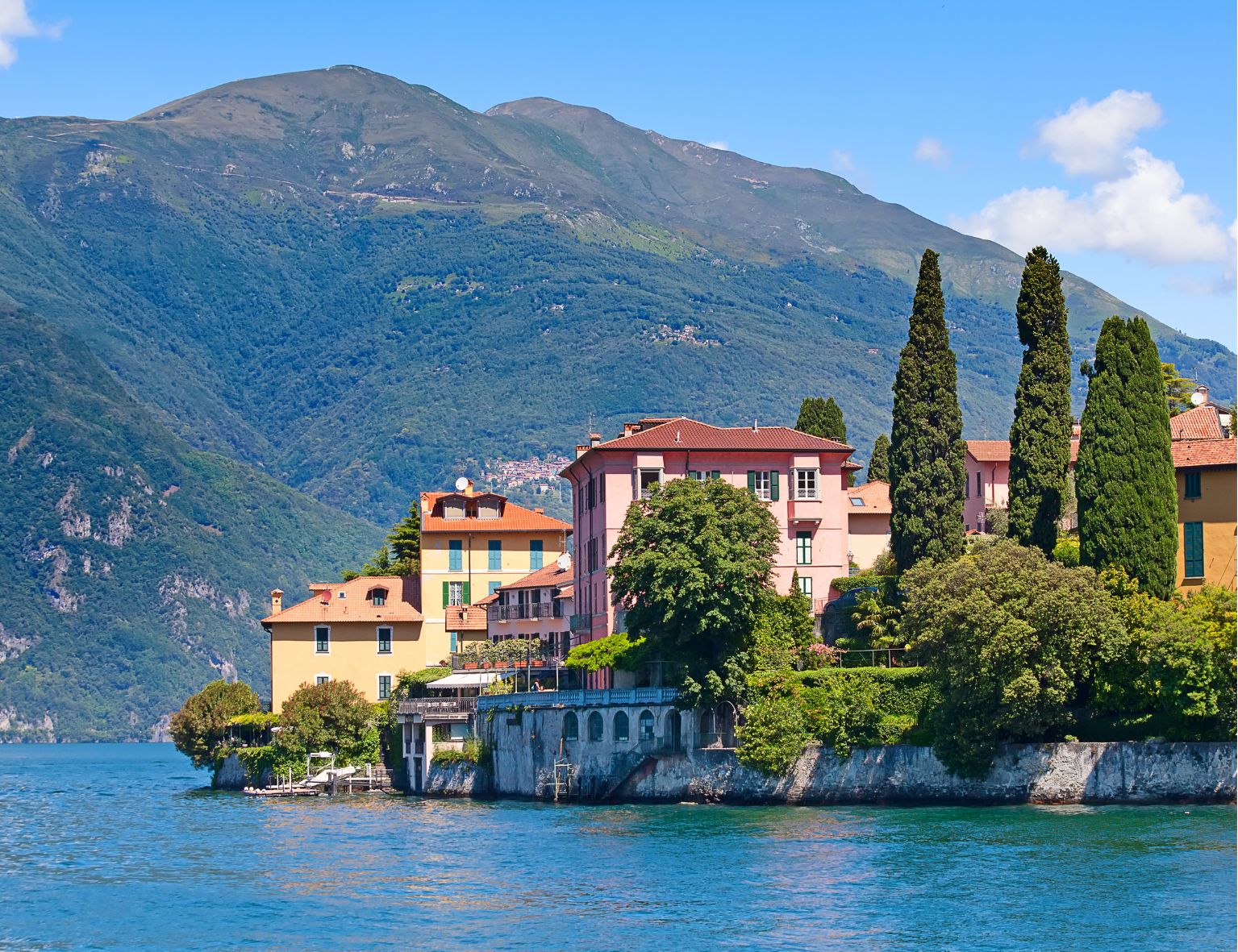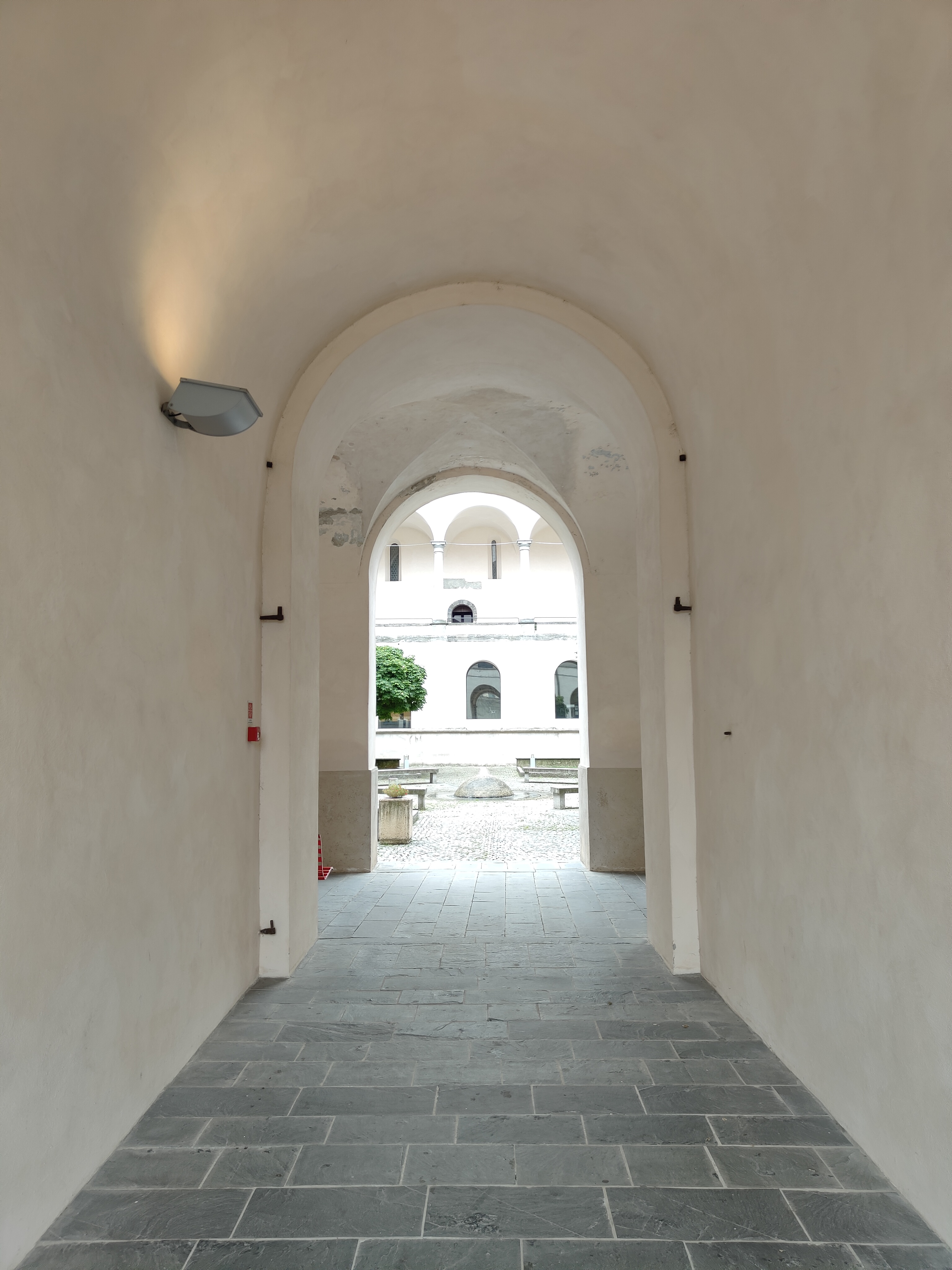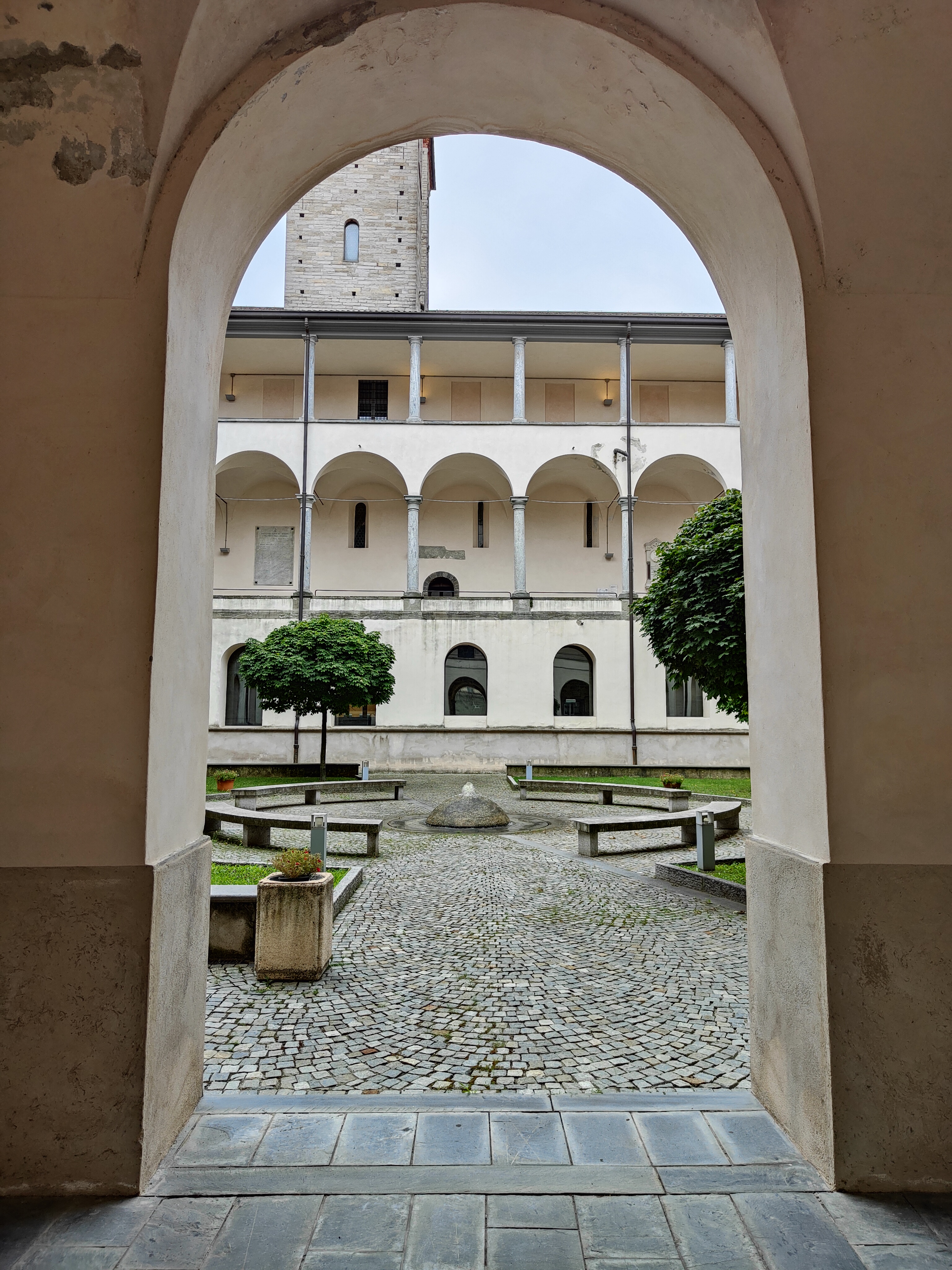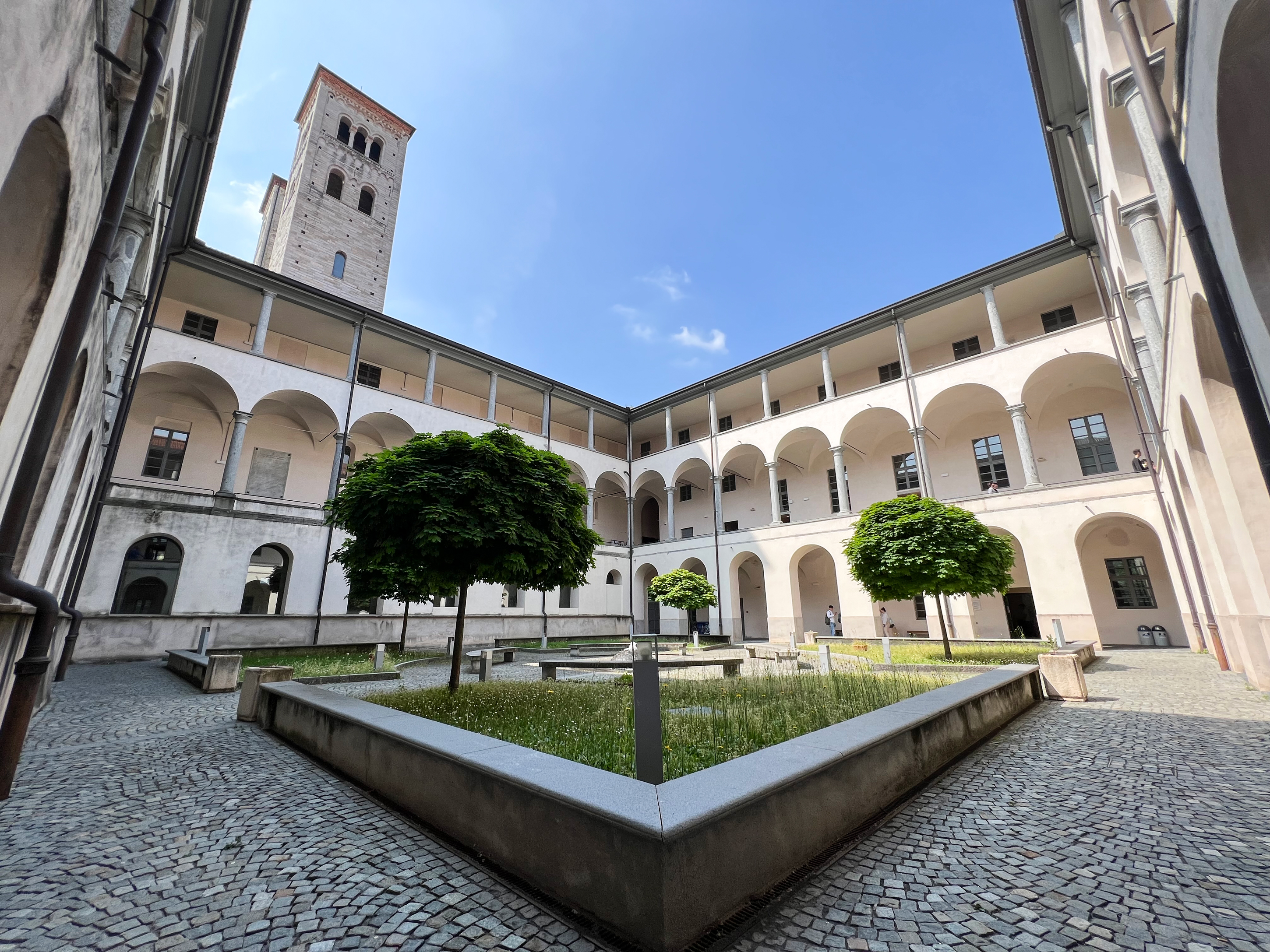The conference will be held in via Sant'Abbondio 12 (Como).
International Inter-Association Conference on the History of Language Learning and Teaching
University of Insubria, Como, Italy
5-7 June 2025
Call for Papers (1st Circular) - CfPs in English, Italian, French and Spanish are attached at the end of this section in PDF format.
Back to the past to understand the present - Exploring the interplay between socio-cultural and political developments and language education
We are pleased to announce the Call for Papers for the international conference “Back to the past to understand the present. Exploring the interplay between socio-cultural and political developments and language education”. The conference will be held at the University of Insubria (Como, Italy), 5-7 June 2025, under the auspices and with the support of the international network of associations and research centres within the field of the history of foreign language learning and teaching, which first convened in Granada in 2008: CIRSIL (Interuniversity Research Centre on the History of Language Teaching), Henry Sweet Society for the History of Linguistic Ideas, SEHL (Spanish Society for Linguistic Historiography), SIHFLES (International Society for the History of French as a Foreign or Second Language), and HoLLT.Net (AILA Research Network for the History of Language Learning and Teaching).
Support is also granted by: ANILS APT (National Association of Foreign Language Teachers) and Lend (Language and New Didactics), Italian associations gathering teachers of foreign languages and Italian language; Phrasis (Italian Association of Phraseology & Paremiology), GISCEL Lombardia (Intervention and Study Group in the Field of Language Education), CRiFLi (Research Centre on Linguistic and Cultural Phenomena), AIA (Italian Association for the Study of English).
All proposals must be submitted by 15 January 2025 EXTENDED 1 February 2025
The Conference will feature the following keynote speakers:
- Carmen Castillo Peña (Università degli Studi di Padova)
- Marc Debono (Université de Tours)
- John Gallagher (University of Leeds)
The aim of this conference is to examine and interpret past developments and challenges in the field of language teaching and learning in order to shed light on contemporary issues and problems. In particular, the objective is to study how socio-cultural and political trends and events have influenced practices and methods in the field of language education over the centuries, as is happening today. What insights can the history of language teaching offer? Have problems similar to those faced today already been addressed in the past? If so, what solutions, tools, and methods were adopted, and with what specific intent? These are some of the research questions that the conference participants will be invited to explore.
Over the centuries, new forces, dynamics, and rapidly changing realities have been triggered by economic, political, and socio-cultural transformations that have led, for example, to migratory crises and armed conflicts, or to globalization in more recent times or to the development of new information and communication technologies (Motteram 2013). All of these have had a significant impact on language teaching and learning and on the complexities to be addressed (Doff & Smith 2022). These issues can be understood by analyzing the texts, materials, and methods developed and used in different countries and historical periods.
Migrations and contacts between peoples of different languages caused by historical reasons (colonialism, fascism, etc.) have influenced language policies and the adoption of specific educational approaches (Di Tullio 2003; Capstick 2020). During wartime conflicts (e.g., world wars), language teaching strategies tied to the military context emerged, with the use of specialized teaching materials and the presence of atypical actors (e.g., interpreters and translators working at the front who were employed as teachers).
Moreover, teachers and students are and have been a reflection of the social dynamics of their time, also implicated in ideologies determined by specific socio-cultural and political circumstances (Ricento 2000). For example, one can observe differences in education, pedagogical approaches, and teaching materials used by female teachers or directed at female learners, rather than males, in specific historical contexts; or, consider how the theme of psychological and social well-being was addressed in the past from the perspective of individual improvement through learning a new language or enhancing one's linguistic skills.
In sum, exploring the history of language teaching in light of transformations in social practices resulting from geo-political, economic, social events and trends may enhance our understanding of past educational developments and allow reflection on the challenges and opportunities of present-day education. Today schools and universities face various urgent issues that can profoundly affect student learning, teaching methodologies, and teacher training. These issues require a critical review of educational objectives, methods, and pedagogical approaches, as well as teaching materials and tools.
History provides us with a valuable perspective to critically assess current practices and inform future decisions in the field of language education (Howatt & Widdowson 2004; McLelland & Smith 2018; Castillo & San Vicente 2023; Smith & Giesler 2023). At the same time, writing the history of language learning and teaching can be seen as a political act. Papers will be welcome which relate to the issue of whether the history of language education can itself ever be apolitical or neutral.
References
Capstick T. (2020), The Interrelationship of Language and Migration: Current and Historical Perspectives, Routledge: London.
Castillo C., San Vicente F. (2023), “Proyectos de catalogación y digitalización de textos para la historia de la didáctica del español a italófonos: Litias, EpiGrama y Revalsi”, Elena Battaner Moro; Juan Alonso López Iniesta (eds.), Humanidades digitales e historiografía lingüística hispánica proyectos de presente y retos de futuro, Madrid, Frankfurt am Main, Iberoamericana-Vervuert, 149-174.
Di Tullio Á. (2003), Políticas lingüísticas e inmigración. El caso argentino, Buenos Aires, EUDEBA.
Doff S., Smith R. (2022), Policies and Practice in Language Learning and Teaching: 20th-century Historical Perspectives, Amsterdam University Press: Amsterdam.
Howatt A.P.R., Widdowson H.G. (2004), A History of ELT, Second Edition, OUP: Oxford.
McLelland N., Smith R. (2018), The History of Language Learning and Teaching II: 19th-20th Century Europe, Legenda: Oxford.
Motteram G. (2013), Innovations in Learning Technologies for English Language Teaching, British Council: London.
Ricento T. (ed.) (2000), Ideology, Politics and Language Policies: Focus on English, Amsterdam and Philadelphia: John Benjamins.
Smith R., Giesler T. (2023), Innovation in Language Learning and Teaching: Historical Perspectives, John Benjamins: Amsterdam.
In light of this context, we propose to examine, from a historical and/or historiographical perspective, geo-socio-political events and developments including the following:
- Migrations, interactions between peoples and languages
- Armed conflicts
- Socio-political and socio-cultural events
- Socio-economic changes
Below are some of the themes that can arise from such issues:
- Multilingualism, multi-/inter-culture/-culturality
- Gender issues
- Equality, inclusion, diversity, discrimination
- Social sustainability
- Psycho-social well-being
- Technological developments
Illustrative research topics:
- Educational materials (dictionaries, glossaries, nomenclatures, grammars, manuals, textbooks, etc.)
- Methodological and glottodidactic approaches
- Teacher training and curricula
- Student curricula
- Institutional and statutory documents
- Testimonials
- Language policies, educational guidelines
- Editorial policies
- Technological innovations
- Schools of thought and ideologies
Open session: the conference also provides for papers not directly related to the conference theme, always from a historical/historiographical viewpoint.
- Marijana Alujević (University of Split)
- Monica Barsi (University of Milan)
- Alice Burrows (University of Paris III: Sorbonne Nouvelle)
- Marc Debono (Université de Tours)
- Cosimo De Giovanni (University of Cagliari)
- Giulio Facchetti (University of Insubria)
- Maria Jose Garcia-Folgado (University of Valencia)
- Gianmarco Gaspari (University of Insubria)
- Giovanni Iamartino (University of Milan)
- Friederike Klippel (Ludwig Maximilians University München)
- Hugo E. Lombardini (University of Bologna)
- Nicola Mclelland (University of Nottingham)
- Andrea Nava (University of Milan)
- Paolo Nitti (University of Insubria)
- Luciana Pedrazzini (University of Milan)
- Despina Provata (National and Kapodistrian University of Athens)
- Gianmario Raimondi (University of Valle d'Aosta)
- Marcus Reinfried (Friedrich Schiller University Jena)
- Daniel Russo (University of Insubria)
- Borbala Samu (University for Foreigners of Perugia)
- Ana Clara Santos (Universidade do Algarve)
- Félix San Vicente (University of Bologna)
- Polina Shvanyukova (University of Udine)
- Richard Smith (University of Warwick)
- Javier Suso Lopez (University of Granada)
- Alessandra Vicentini (University of Insubria)
Alessandra Vicentini, Daniel Russo, Paolo Nitti, Gilberto Giannacchi, Martina Guzzetti, Annachiara Brusa, Mario Corveddu, Loredana Parolisi, Daniela Cermesoni (University of Insubria), Polina Shvanyukova (University of Udine), Hugo E. Lombardini (University of Bologna).
Proposals include panels, oral presentations, and posters.
Panels
Panels should address a common theme, content or methodological area, and will be scheduled for 90 minutes. In addition to individual proposals (no more than 300 words each excluding references), please also submit an overview description of no more than 300 words highlighting the panel’s content and objectives. Provide information about the panel members and the coordinator, stating full institutional affiliations and e-mail addresses.
Oral presentations and Posters
These proposals (no more than 300 words each excluding references) must clearly indicate whether the authors intend to present an oral presentation or a poster. Poster presenters must attend in person to discuss their work during the dedicated sessions. Oral presentations will be allocated 30 minutes each (20 minutes for presentation + 10 minutes for discussion). Please include the name of the authors(s), their full institutional affiliation(s), and e-mail address(es).
15 January 2025 EXTENDED 1 February 2025 - Proposal submission deadline.
25 February 2025 - Notification of proposal acceptance by scientific committee.
Registration Fees
EARLY
15 March – 16 April 2025
€ 60 for Members of partner associations (CIRSIL, HSS, SEHL, SIHFLES, HoLLTnet)
€ 30 for PhD students
€ 90 for Others
LATE
17 April – 22 May 2025
€ 70 for Members of partner associations (CIRSIL, HSS, SEHL, SIHFLES, HoLLTnet)
€ 40 for PhD students
€ 100 for Others
EARLY
15 March – 16 April 2025
€ 60 for Members of partner associations (CIRSIL, HSS, SEHL, SIHFLES, HoLLTnet)
€ 30 for PhD students
€ 90 for Others
LATE
17 April – 22 May 2025
€ 70 for Members of partner associations (CIRSIL, HSS, SEHL, SIHFLES, HoLLTnet)
€ 40 for PhD students
€ 100 for Others
Social dinner (5 June 2025)
The dinner will take place at the lakefront restaurant "Giulietta al Lago", viale Geno, 13, Como, https://www.giuliettaallago.it/. The menu includes a welcome drink, appetizers, first course, dessert, wine, water and coffee.
€ 53
While filling out the form, you will also have the possibility to express interest in a guided tour of Como Basilica of Sant’Abbondio on 6 June 2025 at 18:00. The tour is free upon registration.
ICHoLLT 2025 CONFERENCE REGISTRATION
Please note: In order for your presentation to be included in the conference, the presenting author(s) must register by 22 May 2025. All conference participants must register.
For any questions regarding conference presentations and schedules, please contact: ichollt@uninsubria.it
Please find attached the final programme of the conference.
ICHoLLT 2025 will feature the following Plenary Speakers:
Carmen Castillo Peña (Università degli Studi di Padova)
Title of the talk: La Historiografía Lingüística en la era digital: desafíos, oportunidades y dilemas en el contexto hispánico
Abstract: La revolución digital del siglo XXI está transformando profundamente la forma en que se realiza la investigación en historiografía lingüística y, en particular, la historiografía sobre la enseñanza de lenguas extranjeras. Esta contribución examina el impacto de las nuevas tecnologías en este campo, explorando tanto las oportunidades como los desafíos que presenta la era digital y utilizando como marco de referencia el panorama de la historiografía gramatical hispánica. En primer lugar, se analiza cómo las nuevas tecnologías han revolucionado la investigación historiográfica. La creación de bases de datos exhaustivas y accesibles ha permitido a los investigadores manejar volúmenes de información sin precedentes, facilitando el acceso a fuentes primarias y democratizando la investigación. Todo ello ha repercutido en la metodología de la investigación, ya que el análisis de big data y la lingüística de corpus están redefiniendo los métodos tradicionales en el estudio de la historiografía lingüística. Sin embargo, estos avances no están exentos de problemas. Problemas nuevos y en un cierto modo, paradójicos. Se abordan los desafíos tecnológicos como la obsolescencia de formatos y plataformas, la necesidad de garantizar la sostenibilidad a largo plazo de los recursos digitales, y los retos de financiación que supone mantener y actualizar estas infraestructuras tecnológicas, aspectos particularmente relevantes en el contexto de la investigación hispánica. Por último, se examina cómo estas tecnologías están influyendo en la naturaleza misma de la investigación historiográfica, debido sobre todo al desplazamiento del foco hacia los documentos digitalizados y al surgimiento de campos de estudio anteriormente inaccesibles, como el análisis diacrónico a gran escala. En conclusión, mientras la historiografía lingüística hispánica se adapta a este nuevo panorama digital, es crucial mantener un equilibrio entre aprovechar las oportunidades que ofrecen las nuevas tecnologías y abordar de manera crítica los desafíos que presentan, asegurando que la disciplina evolucione de manera robusta y sostenible en la era digital.
Bibliografía
Battaner Moro, E., López Iniesta, J. A. (éds.) (2023). Humanidades digitales e historiografía lingüística hispánica: proyectos de presente y retos de futuro. Madrid, Frankfurt: Iberoamericana-Vervuert.
Castillo Pena, C., San Vicente, F. (2023). «Proyectos de catalogación y digitalización de textos para la historia de la didáctica del español a italófonos: Litias, EpiGrama y Revalsi», in Battaner Moro, E., López Iniesta, J. A. (éds.), Humanidades digitales e historiografía lingüística hispánica: proyectos de presente y retos de futuro. Madrid, Frankfurt: Iberoamericana-Vervuert, pp. 149-174.
García Aranda, M.ª Á. (2021). «La Biblioteca Virtual de la Filología Española, diez años después», Boletín de la Sociedad Española de Historiografía Lingüística, n°15, pp. 25-41.
Marc Debono (Université de Tours)
Title of the talk: Diffusion et colonialité des savoirs didactologiques : une réflexion historique pour des enjeux de formation actuels
Abstract: Cette communication fait suite à plusieurs évènements et publications portant sur l’histoire du français langue étrangère et seconde (FLE/S), dans la continuité d’un projet sur l’histoire des réceptions des politiques linguistico-didactiques européennes (entre autres : Castellotti et Debono, 2022 ; Debono et Burrows, à par. ; Castellotti et al., 2023). S’il est entendu que la didactique du FLE/S est « née de la diffusion » (Coste, 1986 : 26), il y a un réel enjeu politique à s’intéresser aux différentes manières, passées et actuelles, dont s’organise la diffusion des savoirs didactologiques – français et plus largement européens/occidentaux –, ainsi que sur les réceptions qu’elle engendre / a engendré chez les différents acteurs du champ de l’enseignement-apprentissage du français à travers le monde. Les manifestations de ce que l’on pourrait qualifier de « diffusionnisme didactologique » en FLE/S sont nombreuses, et il existe plusieurs travaux s’y intéressant, en adoptant une perspective historique, à propos de différents contextes (Burrows, 2018 ; Lemaire, 2021 ; Rubio, 2018, Spaëth, 1998 et 2007 ; Vigner, 2000 ; Castellotti et Debono, 2022 et 2024 ; Debono et Burrows, à par., etc.). La diffusion des idées didactiques à partir d’une centralité française (et/ou européenne) étant en grande partie liée au fait colonial, les notions de (post/dé)colonialité actuellement au cœur du débat historique contemporain (voir par exemple, en langue française : Colin et Quiroz, 2023 ; Gaussens, et Makaran, 2024) peuvent nous aider à poursuivre des réflexions plus générales sur la prise au sérieux de l’altérité en FLE/S. Cette exploration historicisante et interprétative a des enjeux très contemporains : à l’heure où l’on fête les 40 ans des filières universitaires de FLE/S (colloque à venir en 20261), force est de constater que les étudiant.e.s qui s’engagent dans cette voie formative manifestent une préoccupation de plus en plus importante quant à leur rôle dans un écosystème très marqué par l’histoire de la diplomatie d’influence française.
Bibliographie
Burrows, A. (2018). L’Alliance française de Buenos Aires de 1914 à 1983 : étude des conditions de circulation linguistique. Thèse de doctorat, Université Sorbonne Nouvelle : Paris.
Castellotti, V. et Debono, M. (dir.) (2022), « Histoire des idées dans la recherche en didactique du FLE/S et des langues : 1945-2015 »,Documents pour l'Histoire du français langue étrangère ou seconde, nº 68. URL : https://journals.openedition.org/dhfles/8642
Castellotti, V. et Debono, M. (2024). « Élaborations et réceptions des politiques didactico-linguistiques européennes. Témoignages contrastés pour une histoire du temps présent », Lidil, n°69. URL : https://journals.openedition.org/lidil/12347
Castellotti, V., Debono, M., Giesler, T., Liddicoat, A., Pfingsthorn, J., Smith, R. (2023), panel Passé, présent et statut/rôles potentiels de l'histoire dans la formation des enseignants de langues / Past, present and potential status and roles of history in language teacher education, colloque inter-associations de Faro, 28 juin 2023.
Colin, Ph. Quiroz, L. (2023), Pensées décoloniales. Une introduction aux théories critiques d'Amérique latine, Paris : La Découverte.
Coste D. (1986). Didactique et diffusion du français langue étrangère. Questions de priorité. Études de linguistique appliquée 64, pp. 17-30.
Debono, M. et Burrows, A. (à par.), Langues coloniales, langues indigènes : quelle organisation du contact linguistique dans les écoles coloniales pour quels héritages post-coloniaux ? (1884-1998/ 2023), Documents pour l'Histoire du français langue étrangère ou seconde, nº 71.
Gaussens, P. et Makaran, G. (2024). Critique de la raison décoloniale. Sur une contre-révolution intellectuelle, Paris : Éditions L’Echappée.
Lemaire, E. (2021). « Didactique du plurilinguisme et du pluriculturalisme et pédagogies autochtones : quelle dialectique ? », Recherches en didactique des langues et des cultures [En ligne], 18-2 | 2021, mis en ligne le 30 septembre 2021. URL : http://journals.openedition.org/rdlc/9050
Rubio, C. (2018). Une langue en mission, histoire des politiques linguistiques et didactiques françaises en Palestine. Thèse de doctorat. Université de Tours, https://hal.science/tel-02060587v1
Spaëth, V. (1998). Généalogie de la didactique du français langue étrangère. L’enjeu africain, Paris : Didier Érudition.
Spaëth, V. (2007). Théories, pratiques et politiques de la langue. L'enseignement du français : des colonies au français langue seconde (XIXe-XXe siècles), Synthèse d’HDR, Sorbonne Nouvelle : Paris.
Vigner, G. (2000). « L'enseignement et la diffusion du français dans l'empire colonial français. 1815-1962 », Documents pour l’histoire du français langue étrangère ou seconde, N°25, en ligne : https://journals.openedition.org/dhfles/ 2913.
John Gallagher (University of Leeds)
Title of the talk: Language labour in the multilingual city: teaching, learning, and translating in early modern London and beyond
Abstract: The teaching and learning of languages in the early modern period was often an urban pursuit. Cities were sites of schools, academies, and universities, of bookshops brimming with language-learning texts, where migration and mobility of different kinds brought different languages and their speakers into contact with learners who had need of their skills. Early modern cities also ran on language labour: the work of teachers and tutors (many of them migrants of different kinds), but also of translators, interpreters, tour guides, and servants, all of whom sought to trade on their multilingual abilities in a competitive urban economy. Language teaching in early modern cities was inseparable from these other forms of linguistic labour: bilingual servants could hone a learner’s linguistic abilities or help a traveller to negotiate the city’s linguistic landscape, notaries and scribes could moonlight as tutors or writers of pedagogical materials, and multilingual schoolteachers or scholars could find themselves brought into courtrooms and urban archives when linguistic difference demanded their expertise. Language-learning texts and educational institutions emerged from and were shaped by urban economies which relied on linguistic labour. This lecture will begin with early modern London during a ‘migration moment’ in the later sixteenth and early seventeenth centuries, tracing the city’s languages and those who worked between them, and showing how the teaching and learning of languages were embedded in broader economies of linguistic labour. Throughout, it will also look more broadly, arguing that multilingual cities in the early modern world can show us how linguistic labour related to pressing questions in the social histories of education, migration, and the city itself.
References
Gilbert, C. (2018). «A grammar of conquest: the Spanish and Arabic reorganization of Granada after 1492», Past & Present, n°239, pp. 3-40.Glück, H., Häberlein, M., Schröder, K. (2013). Mehrsprachigkeit in der Frühen Neuzeit: Die Reichsstädte Augsburg und Nürnberg vom 15. bis ins frühe 19.Jahrhundert. Wiesbaden: Harrassowitz.
Merwick, D. (1999). Death of a Notary: Conquest & Change in Colonial New York. Ithaca: Cornell University Press.
Niedźwiedź, J. (2023). Literacy in Medieval and Early Modern Vilnius: forms of writing and rhetorical spaces in the city. Turnhout: Brepols.
Perlin, R. (2024). Language City: The Fight to Preserve Endangered Mother Tongues. New York: Grove Press.
Wright, L. (2007). «Speaking and listening in early modern London», in Steward, J., Cowan, A. (éds.), The City and the Senses: Urban Culture since 1500. London: Routledge.
Please find attached the ICHoLLT 2025 Book of Abstracts.
The papers resulting from the conference presentations will be published in one or more specialized journal(s) or in one or more volume(s), following evaluation by the scientific committee and based on double-blind peer review.
4 June 2025
"Researching the history of language teaching and learning".
Pre-conference study day dedicated to PhD students and Early Career Researchers.
Please download the programme below.
The conference venue is in Via Sant'Abbondio 12, Como, Italy.
We advise participants to contact hotels/B&Bs directly to make a reservation.
Here is a (non-exhaustive) list of hotels and B&Bs. For additional accommodation options, please refer to online booking platforms:
- Palace Hotel: www.palacehotel.it (15% discount for ICHoLLT 2025 participants)
- Hotel Metropole Suisse: https://www.hotelmetropolesuisse.com/ (10% discount for ICHoLLT 2025 participants).
- B&B Hotel Como City Center: www.hotelbb.com (5% discount for ICHoLLT 2025 participants. Code: ICHOLLT5)
- Hotel Tre Re: https://hoteltrere.com/
- Hotel Plinius: https://www.hotelplinius.com/
- B&B Hotel Como Camerlata: https://www.hotel-bb.com/en/hotel/como-camerlata
- Hotel Barchetta: https://www.hotelbarchetta.it/
- Albergo Firenze Como: https://www.hotelfirenzecomo.com
The dinner will take place at the lakefront restaurant "Giulietta al Lago", viale Geno, 13, Como, https://www.giuliettaallago.it/. The menu includes a welcome drink, appetizers, first course, dessert, wine, water and coffee.
We will offer a guided tour of the Basilica of Sant’Abbondio, an 11th-century Romanesque church located close to the conference venue. The tour will be led by a professional English-speaking guide on 6 June at 18:00.
English, French, Italian, and Spanish
Browse the section
The Organising Committee
Alessandra Vicentini, Daniel Russo, Paolo Nitti, Gilberto Giannacchi, Martina Guzzetti, Annachiara Brusa, Mario Corveddu, Loredana Parolisi, Daniela Cermesoni (University of Insubria), Polina Shvanyukova (University of Udine), Hugo E. Lombardini (University of Bologna).
Email address: ichollt@uninsubria.it

